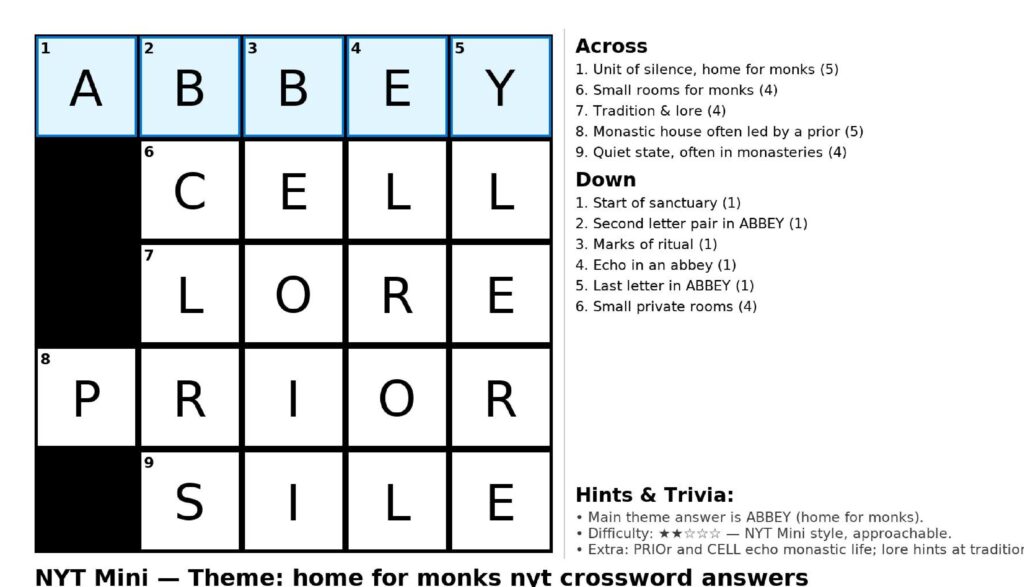By The Wandering Quill | Published: August 22, 2025
In the heart of a crossword puzzle, words are more than letters — they are sanctuaries. When you encounter “Home for Monks” in the New York Times crossword, you are not just filling squares; you are stepping into cloisters, abbeys, and monasteries where centuries of silence hum like an eternal hymn.
What Does “Home for Monks” Mean?
Monastic Life and Sacred Homes
A home for monks is not a place of mere walls and roofs. It is a cradle of silence, devotion, and contemplation.
The Cloister, The Monastery, The Abbey
-
Abbey: Large and historic, often with abbots leading.
-
Monastery: A broader term for monastic residence.
-
Cloister: The quiet courtyard where monks walk.
-
Priory: Smaller and humbler, yet sacred.
Crossword Clue Context
Why “Home for Monks” Appears in NYT Crossword
Crossword puzzles thrive on cultural, historical, and spiritual references. “Home for Monks” ties language to heritage, testing memory and curiosity.
Puzzle Culture and Language Play
It is a clue that blends history with brevity — perfect for a crossword square, poetic in its brevity.
Common Crossword Answers
Abbey
The most frequent answer. Short, lyrical, and medieval in tone.
Cloister
Longer, often reserved for Sunday puzzles. Symbolic of quiet life.
Monastery
The classic. Eight letters, weighty, spiritual.
Priory
A hidden gem, often used in tougher crosswords.
The Poetry of a Cloistered Life
Walls that Speak Silence
Every wall of a monastery is a book of stone, filled with pages of prayer.
Bells that Ring Time
Time in abbeys is not measured by hours but by bells calling for devotion.
Monasteries Across Cultures
Christian Traditions
From Benedictines to Trappists, abbeys shaped European landscapes.
Buddhist Monasteries
High on mountains, monks chant sutras as prayer wheels spin.
Shaolin Temples
Homes not only of prayer but of discipline, martial art, and meditation.
Crossword Style Explanation
Clue Breakdown
Clue: Home for monks (5)
Answer: ABBEY
Hint, Answer, Difficulty Rating
-
Hint: Often seen in Europe, with bells.
-
Answer: ABBEY
-
Difficulty: ★★★☆☆ (medium)
Trivia & Word Origins
The word abbey stems from Latin abbatia, meaning “father’s house.”

Across & Down Clues (NYT Mini Style)
Across
-
Home for monks (5) → ABBEY
-
Quiet courtyard (8) → CLOISTER
-
Sacred residence (9) → MONASTERY
Down
-
Small monastic house (6) → PRIORY
-
Ringing bell of devotion (4) → PEAL
-
Life of reflection (7) → SILENCE
Why These Words Fit Perfectly in Crosswords
Short, Elegant, and Timeless
Crosswords favor words like abbey — simple, cultural, and deeply symbolic.
The Symbolism of “Home for Monks”
Shelter Beyond Walls
A monastery is not just shelter; it is spirit embodied.
A Metaphor for Peace
When life feels loud, the idea of an abbey is a metaphor for calm.
Pop Culture & Monastic Homes
Movies and Literature
From The Name of the Rose to The Sound of Music, abbeys echo in stories.
Mystical Portrayals
Silent monks are often depicted as keepers of secrets and wisdom.
Spiritual Lessons Hidden in a Crossword
Crosswords, like monasteries, demand patience. Every clue is a meditation, every square a prayer.
The Emotional Weight of Sacred Words
Why do we pause at “abbey” or “cloister”? Because they carry centuries of meaning within just a few letters.
The Journey of Solitude in Wordplay
Each crossword answer is a pilgrimage. ABBey is not just filled in — it is entered, walked through, lived.
Conclusion: Every Crossword a Pilgrimage
The next time you see “Home for Monks” in the NYT Crossword, remember you are not just solving a puzzle. You are walking through abbeys, hearing bells, and stepping into silence. Words, like monks, find their true homes in peace.
FAQs
1. What is the most common answer to “Home for monks” in NYT Crossword?
The answer is usually ABBey.
2. Can “Monastery” also be correct?
Yes, depending on the puzzle length.
3. Why do crossword puzzles use monastic terms?
They are short, meaningful, and historically rich words.
4. What is the origin of the word “Abbey”?
It comes from Latin abbatia, meaning father’s house.
5. Are these answers always religious?
Mostly, but sometimes used metaphorically for quiet places.








